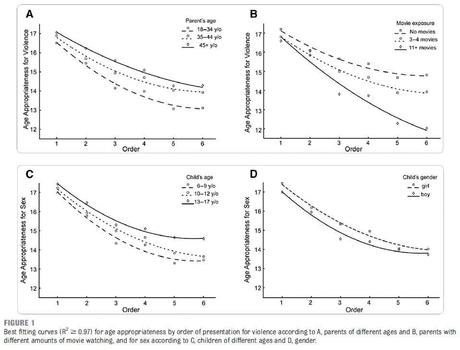Over the past few decades, the Motion Picture Association of America (MPAA) has allowed more sex and violence to appear in PG-13 movies, increasing exposure to sexual and violent behavior for adolescents aged 13-17. In fact, in 2012, PG-13 movies showed more gun violence than R-rated movies, and sexual activity has increased substantially within the R-rated movies. Some call this "ratings creep" - over the years, increasing amounts of sex and violence appear in movies rated for younger audiences.
This may be because parents and ratings administrations have become more desensitized (i.e., they have gotten more used to) to sex and violence, and don't worry as much about it appearing in movies. There is some evidence from the Kaiser Family Foundation ( www.kff.org) that this might be the case over long-term periods of time.

But does desensitization occur over the short-term, while watching short movie clips that depict sex and violence? For instance, if a parent is exposed to movies with sex or violence on YouTube, NetFlix, Amazon Prime, or otherwise, will they become more accepting of sex and violence, and let their kids watch at a younger age?
Researchers from the University of Pennsylvania, Ohio State University, and VU University Amsterdam, investigated exactly that question.
What the study did. The study asked parents to watch a set of 6 randomly ordered PG-13 and R-rated movie clips, each of which depicted sex or violence. After each movie, the parents were asked the age they think it would be OK for a child to see the movie, ranging from 6-19 years of age.
What the study found. As parents viewed more clips, their age ratings decreased. In other words, while they watched the six movie clips they became more willing to let younger kids watch the sexual behaviors (e.g., initiating explicit sex) and acts of violence against humans and animals. When they began watching clips, they tended to report minimum ages of around 17 years old; by the end of the 6th clip, they reported minimum ages around 14 years old.
For violent movies, this pattern was strongest for younger (ages 18-34) versus older (ages 45+) parents. It was also strongest for parents who tend to watch a lot of movies.
For sexual movies, this pattern was strongest for parents with younger children (ages 6-9) versus older children (ages 13-17). It was also stronger when they had male versus female children.
The below charts show these patterns:

Why the study matters. The study provides the first experimental evidence that parents who are repeatedly exposed to movie clips containing sexual acts and violence become increasingly willing to let their children watch the movies. This increasing willingness to allow children to watch videos containing sex and violence likely underlies the MPAA rating committee's increasingly lenient stance on movie ratings (for better or worse).
Reference (click to view free article):
Disclosure
Mommyhood101 is funded by parents like you! Use of this site is subject to our terms of use and privacy policy. Mommyhood101 participates in the Amazon Services LLC Associates Program, an affiliate advertising program providing a means for sites to earn advertising fees by linking to Amazon.com. Most product links lead directly to an affiliate partner.
Why Trust Mommyhood101?
Rest assured that as doctoral-level scientists, parents, and the owners of this small business, we have over 20 years of combined experience testing and reviewing over 2400 different baby and toddler products. Since we started this site in 2009, over 100 million parents and parents-to-be have trusted us to provide honest and well-researched information on the topics of pregnancy, parenting, and baby and toddler gear reviews. We never publish any content related to the health or well-being of your child without first consulting with expert pediatricians, midwives, therapists, OB/GYNs, and other specialists as appropriate. Read more about the Mommyhood101 Team here. If you ever have any questions, we are always available to chat on Facebook Messenger or email, and look forward to helping you make the best decisions for your child.

